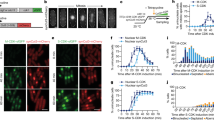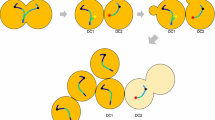Abstract
In Saccharomyces cerevisiae, entry into S phase requires the activation of the protein kinase Cdc28p through binding with cyclin Clb5p or Clb6p, as well as the destruction of the cyclin-dependent kinase inhibitor Sic1p. Mutants that are defective in this activation event arrest after START, with unreplicated DNA and multiple, elongated buds. These mutants include cells defective in CDC4, CDC34 or CDC53, as well as cells that have lost all CLB function. Here we describe mutations in another gene, CAK1, that lead to a similar arrest. Cells that are defective in CAK1 are inviable and arrest with a single nucleus and multiple, elongated buds. CAK1 encodes a protein kinase most closely related to the Cdc2p family of protein kinases. Mutations that lead to the production of an inactive kinase that can neither autophosphorylate, nor phosphorylate Cdc28p in vitro are also incapable of rescuing a cell with a deletion of CAK1. These results underscore the importance of the Cak1p protein kinase activity in cell cycle progression.
Similar content being viewed by others
Author information
Authors and Affiliations
Additional information
Received: 2 January 1997 / Accepted: 20 June 1997
Rights and permissions
About this article
Cite this article
Chun, K., Goebl, M. Mutational analysis of Cak1p, an essential protein kinase that regulates cell cycle progression. Mol Gen Genet 256, 365–375 (1997). https://doi.org/10.1007/s004380050580
Issue Date:
DOI: https://doi.org/10.1007/s004380050580




